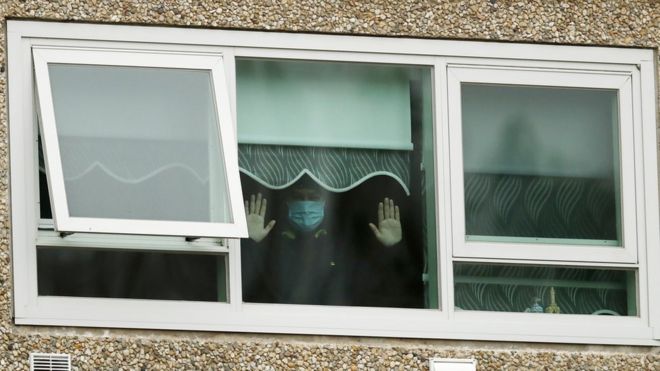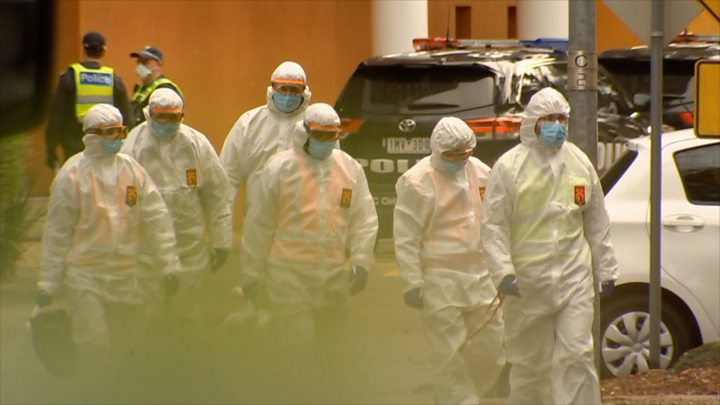 GETTY IMAGES
GETTY IMAGESBBC
Australia's second-largest city has begun a second lockdown in response to a spike in new coronavirus infections.
Melbourne's five million residents will be barred from leaving home for six weeks, except for essential reasons.
Police say they are setting up a "ring of steel" around the city, with "checkpoints anytime and anywhere" to enforce the measures.
Borders between Victoria, of which Melbourne is the capital, and neighbouring states closed on Tuesday.
Prime Minister Scott Morrison paid tribute to Melburnians' resilience on Wednesday.
"The rest of the country knows that the sacrifice that you're going through right now is not just for you and your own family, but it's for the broader Australian community," he said during a news conference.
Victoria State Premier Daniel Andrews announced the Melbourne lockdown on Tuesday after the state saw 191 new infections, its highest daily number since the pandemic began.
Source: Victoria State Government
Wednesday's figure was down to 134, but still much higher than numbers in the rest of the country.
"I think people are definitely more scared this time. People are acting more erratic - you can see that on the roads, at the shops," one resident, Gael Baek, told the BBC.
Australia has recorded almost 9,000 cases and 106 deaths from the virus.
- Why has Melbourne's virus outbreak worsened?
- The border town divided by lockdown
- The 3,000 Australians under police guard at home
On Wednesday, the Melbourne outbreak was linked to three cases in the Australian Capital Territory and one in New South Wales.

What are the new restrictions?
People will be kept to their homes and will only be able to leave for essential reasons, such as for work, exercise and shopping for food and other necessities.
Schools will largely return to distance learning and restaurants will, once again, only be permitted to serve takeaway food. However, shops and hairdressers will remain open.
The lockdown covers only Melbourne and an area to the north called the Mitchell Shire. But the state as a whole has been sealed off from neighbouring New South Wales and South Australia.

Police and troops have been stationed at dozens of border crossings and patrol the vast borders with drones and other aircraft.
As of Thursday, they will also be doing random checks on vehicles in and around the city.
Brief taste of normality gone
Ellie Cobb, BBC in Melbourne
As Melbourne heads into its second major lockdown, the vibe is one of resilience tinged with anxiety for what's to come.
Once again, the local streets are empty, and people in socially distant queues outside coffee shops have a look of resignation. Restaurants are back to serving takeaway only.
One question on the lips of many is whether schools will go back after a week-long holiday extension or whether parents are facing another round of home schooling.
With 12 "hotspot" postcodes, mainly in the west and north of the city, already on lockdown for a week, the millions of Melburnians who have woken up to a new round of "stage three" restrictions are wondering why the spread wasn't better contained.
Many are finding it extra tough to have their movements curtailed again after a brief taste of normality, but there's an overarching sense that this is a key moment for the city to turn things around.
How did it come to this?
For months Australia had felt optimistic about containing Covid-19, but then came the resurgence of the virus in Melbourne.
Other Australian states have dramatically slowed or eradicated the virus, but in Victoria private security guards overseeing hotel quarantines reportedly broke the rules.
Mr Andrews described cases of illegal socialising between staff, such as workers sharing a cigarette lighter or car-pooling. Local media also reported claims of sex between guards and quarantined travellers.
On 2 July, a lockdown was placed on about 300,000 residents in "hotspot" suburbs. This has now been extended to the whole city.
On Saturday, the government also controversially locked down nine housing estate tower blocks after a cluster was found there. About 3,000 residents were confined to their homes.

Authorities have said they will lift that lockdown - Australia's toughest - once residents have been tested.
What concerns authorities now is that local transmission is the key source of infections. Previously, most cases had come from returning travellers.
How is the rest of Australia reacting?
Other states have shut their borders to Victoria. New South Wales is also considering isolating some of its towns on the border.
"Every resident in NSW should feel on high alert and should be extra careful," said NSW Premier Gladys Berejiklian, citing her state's proximity to Victoria.
"We won't know for a few weeks whether there's been any level of community transmission bubbling away under the surface, as can happen easily, as Melbourne has demonstrated."
NSW has blamed airline Jetstar for allowing passengers on a flight from Melbourne to Sydney disembark on Tuesday without being screened. All of the passengers have since been tracked down.
Mr Morrison has said Australia may place limits on the return of nationals from overseas, as hotel quarantine operations near capacity.
The government has faced calls from the Australian Medical Association and others to recommend people in hotspots wear face masks.
When does the lockdown start?
The restrictions will be introduced from 11.59pm on Wednesday, 8 July 2020 and they will last for six weeks.
When can I leave my house?
As during the previous stage three lockdown, the four reasons to leave the house are: shopping for food and essential items, care and caregiving, daily exercise, work and study. But if you can work or study from home, you must. Employers must support you to work from home.
You can leave your house if you are at risk of family violence or to apply for an intervention order, and to attend court or a police station.Caregiving includes managing shared custody arrangements, using a babysitter, leaving home to care for animals housed elsewhere, visiting someone in an aged care home, and visiting someone in hospital. Specific directions apply.
You can also leave your house to access medical services. This time around, that explicitly includes leaving your house to give blood. Access to medical services is unrestricted: you can access them anywhere in Victoria.
Is my municipality included?
The full list of municipalities are at the bottom of this story. But the main point is that all local government areas within metropolitan Melbourne will be affected, as well as Mitchell Shire, which is north of the city. Rules will stay the same in regional areas.
Can I have visitors to my house? Can I see my partner?
You cannot have visitors or go to another person’s house unless it is for the purpose of giving or receiving care. You can leave your house to visit a person if you are in an “intimate personal relationship” with them. That is, there is no “bonk ban”.
Do I have to stay in Melbourne?
The stay-at-home rules apply to your main place of residence so you will not be able to get out of Melbourne and stay in your holiday house. The government says this is to stop the virus being spread to other parts of the state.
Can I still dine in at a restaurant or cafe?
No. Restaurants and cafes will only be able to trade as takeaway and delivery businesses.
Will the shops be open?
Shopping centres, markets and other retailers will be allowed to trade but subject to density rules limited by people per square metre. Strictly speaking, you will only be allowed to go to the shops to buy food and essential items. If you need help with shopping, or need to help a friend or family member, you can go shopping together but remain 1.5m apart.
What about other businesses and services?
Pubs, bars and nightclubs will be closed and bottle shops will be takeaway only. Beauty services will be closed, but hairdressers can stay open.
Entertainment and cultural venues such as music venues, museums, indoor and outdoor cinemas, and the casino will be shut. Brothels and strip clubs will also shut. Libraries and community venues can only stay open for essential services, or to host weddings and funerals.
Real estate inspections will be by appointment only and auctions will be conducted remotely.
What are the rules for exercise?
Exercise is still a permitted reason to leave your house. But you will not be allowed to leave metropolitan Melbourne to exercise, meaning long bush walks or leaving Melbourne to go fishing or surfing are no longer permitted.
Swimming pools, playgrounds and gyms will be shut, and community sport will also stop. Sports like golf, tennis and boating can continue, but again, you cannot leave Melbourne to do them.
You can exercise with members of your household or one other person. You can also hire a personal trainer.
What is happening with schools?
Year 11 and 12 students will return to school as planned, as will students in special schools. All other students will get an extra week of school holidays.
What happens to weddings, funerals or religious services?
Religious services will need to be broadcast online. Weddings will be able to include five people (couple, two witnesses and the celebrant) while the limit will be for 10 people at funerals (not including those conducting the service).
Holiday accomodation and camping venues will need to close. Travel within Victoria is allowed only for work and education, and only if necessary.
Can I travel to Melbourne?
You cannot travel to Melbourne or the Mitchell Shire unless it’s for work or study, medical care and caregiving, shopping for food or supplies. Exercise is not a valid reason to travel.
You can travel through Melbourne or the Mitchell Shire on your way to somewhere else, but it’s recommended you don’t stop unless it’s for one of those three reasons.
What if I break the rules?
Andrews said on Tuesday police would monitor traffic seeking to leave metropolitan Melbourne and officers would also enforce the restrictions within the city. Victoria police can issue on-the-spot fines of up to $1,652 for individuals and up to $9,913 to businesses.
Full list of municipalities: Banyule, Hume, Moreland, Bayside, Kingston, Mornington Peninsula, Boroondara, Knox, Nillumbik, Brimbank, Manningham, Port Phillip, Cardinia, Maribyrnong, Stonnington, Casey, Maroondah, Whitehorse, Darebin, Melbourne, Whittlesea, Frankston, Melton, Wyndham, Glen Eira, Monash, Yarra, Greater Dandenong, Moonee Valley, Yarra Ranges, Hobsons Bay, Mitchell Shire.









